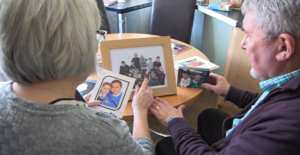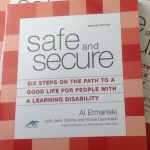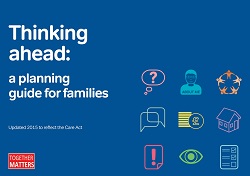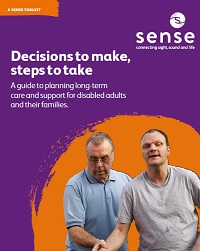Independent Living
Transition from Children’s to Adult Social Care
Is your young person moving from Children’s Services into Adult Social Care in Cambridgeshire or going to need to in future?
The transition is explained on the County Council’s website where you can find out about how the move is planned – it’s called the “transfer pathway”.
Work should start with young people from when they are 14 (at least) and cover areas including independence, preparing for work, future living and support, health and money.
If your young person has a social worker already, preparation for the move will start in their 16th year. Children’s Social Sorkers will ask the council’s SEND Service Young Adults Team to start to plan and put in place social care support for when they turn 18. The team will support young people with learning disabilities and autism.
The most appropriate Adult Social Care Team will be identified for them and provide support as young people turn 18.
These teams are:
- Adult Autism and Support Team (AAT)
- Mental Health Service
- SEND Service Young Adults Team supporting 18 -25s
- Physical Disability Team
- Sensory Team
Some young people who do not have a children’s social worker but may need social care support as an adult. Where this is the case, the appropriate adult social care team will start working with a young person from around the age of 16 to assess eligibility and arrange adult support if needed.
Contact Social Services through the council’s Contact Centre on 0345 045 5203. If your child or young person has an EHCP, you should be discussing this at your annual review.
Support from Adult Social Care for young people with complex needs
Young people aged 18 and over with learning or physical disabilities, or with sight or hearing loss, may be supported with their housing and daily living through Cambridgeshire County Council’s Adult Social Care team
Young people already working with Adult Social Care should ask their social worker for information about housing and daily living options. Young people who are not receiving support from Adult Social Care can ring 0345 045 5202 to request an assessment.
To find out more about housing and supported living, requesting an assessment from Adult Social Care and funding, visit the county council webpage adults and older people.
Technology-Enabled Care Team
Cambridgeshire County Council Technology-Enabled Care Team can provide a range of assistive, telecare and telehealth devices, and aids that can make life easier for people with disabilities. The team takes referrals from anyone, for anyone, for all ages and all diagnoses.
There are some helpful slides with further information here.
Could be useful...
Contact the Young Adults Social Care Team (18 – 25)
For general queries, please call 01480 372669. Or to make a referral or ask for an assessment phone the Contact Centre on 0345 0455203.
Useful websites – national
Useful reading
- Special Needs Jungle article on transitioning to adult social care from children’s services.
- Leaving school: transition planning for a young person with autism – by Rachel Babbidge, Transition Support Service Coordinator at The National Autistic Society.
- SEN Magazine’s September 2017 issue has a feature about the law supporting young people with SEN in the transition to adulthood, written by Specialist SEN solicitor Douglas Silas. Read the article
Housing options for young people 
You can read the Cambridgeshire Guide to Independent Living 2025 here.
Is your son or daughter is thinking about moving out and living independently? Here’s an overview of the different kinds of housing options for young people in Cambridgeshire, written by the county council. Support Living Options for Young Adults updated Nov 2017
Housing and independent living information from Cambridgeshire County Council can be viewed here.
Visit our housing page for details about:
- getting on the local council housing register – you must be 16 to apply
- housing adaptations and funding help such as the Disabled Facilities Grant.
Housing support in Cambridgeshire
In Cambridgeshire, the five district councils provide housing information and support for tenants and homeowners – including young people with additional needs and disabilities wanting to live independently.
The district councils in Cambridgeshire are:
- Cambridge City Council, Housing Department
- East Cambridgeshire District Council, Housing Department
- Fenland District Council, Housing Department
- Huntingdonshire District Council, Housing Department
- South Cambridgeshire District Council, Housing Department
To apply to join the housing register you must be over 16 years of age. Anyone under 18 will require a responsible adult to hold their tenancy in trust if they are made an offer.
Home-Link
 All district councils in Cambridgeshire are part of Home-Link, the choice based lettings scheme for all council and housing association homes in Cambridgeshire. Properties that are available for rent are advertised each week on the website and registered users then “bid” for available properties.
All district councils in Cambridgeshire are part of Home-Link, the choice based lettings scheme for all council and housing association homes in Cambridgeshire. Properties that are available for rent are advertised each week on the website and registered users then “bid” for available properties.
You can find Frequently Asked Questions here.
Home-link has an access strategy to make sure people with different needs including disabilities are treated fairly when choosing housing.
Help with the rent
Housing Benefit provides help with paying rent if you are on a low income but is being gradually replaced as part of the roll out of Universal Credit, the new benefit for people of working age, which aims to run UK-wide by September 2018.
Government webpage on housing benefit
Contact A Family’s guide to Universal Credit
Housing adaptations
Disabled children with complex needs may require adaptions to their housing to ensure that it is safe, accessible and meets their needs. There is funding to help meet the cost of housing adaptations for disabled children. The Disabled Facilities Grant (DFG), awarded by district councils, currently provides up to £30,000 towards the cost of building adaptations that are assessed as meeting eligibility criteria. You will need a referral from an occupational therapist (OT) to apply for a DFG.
- Find out more about the grant from the government website
- Visit the CCC website for more information on housing adaptations.
Housing Options leaflet
Cambridgeshire Community Services has a “housing options” leaflet to help families provide a a home that is suitable for their family’s needs.
These may be any combination of:
• Rehabilitation
• Adaptations and/or specialist equipment within your home
• Moving home
• Extending your current home
The Occupational Therapist is the first point of contact so that an assessment can be made. A referral will then be sent on your behalf highlighting your child or young person’s needs.
More about the OT service in Cambridgeshire
Could be useful…
- The county council’s website – Preparing for Adulthood housing and independent living
- Mortgages for people with disabilities/support needs- My Safe home website
Shared lives schemes
 Shared lives schemes support adults with learning disabilities, mental health problems or other needs that make it harder for them to live on their own.
Shared lives schemes support adults with learning disabilities, mental health problems or other needs that make it harder for them to live on their own.
The schemes match someone who needs care with an approved carer. The carer shares their family and community life, and gives care and support to the person with care needs. Some people move in with their shared lives carer, while others are regular daytime visitors. Some combine daytime and overnight visits. Shared lives schemes are available across the country and are an alternative to traditional kinds of care, such as care homes.
The schemes are also known as adult placements.
Sharing a home, family and community life with a shared lives carer lets you get to know and bond with the carer.
Before starting the scheme, you have the chance to get to know the shared lives carer and decide whether you want to spend time together.
People sometimes use a shared lives scheme as a way of learning the skills they need to live independently and to help them put down roots in the area or community before moving into a place of their own.
To read more about the scheme follow this link.
Planning for the future
Thinking about future arrangements and finances for someone you care for can be daunting. The organisations below are good starting points.
Mencap
Mencap offers free Planning for the Future sessions for parents and carers as well as guides and books that offer information about writing wills and setting up trusts.
To find out more, visit the charity’s wills and trust webpage.
Thera Trust
Thera Trust also offers practical advice and support to adults with a learning disability (and their families) to live the lives they choose.
 It’s Safe and Secure book has been written to help families and will:
It’s Safe and Secure book has been written to help families and will:
- Inspire you to face your fears and plan for the future of your relative when you are no longer around.
- Help you to be sure that your wishes, dreams and desires for your relative can shape their future.
- Guide you through the process of making sure that your relative will always have people around them that know and care about them.
- Help you to make a plan for your relative’s legal and financial security, along with practical tips about how to put these in place.
Find out more about future planning on the Thera Trust website.
Together Matters
 Together Matters is a small organisation built on the belief that talking and working together help to make better things happen in the lives of people with learning disabilities and their families.
Together Matters is a small organisation built on the belief that talking and working together help to make better things happen in the lives of people with learning disabilities and their families.
Its Thinking Ahead guide aims to support families in talking about and planning for the future.
You can download a copy to read, save to your computer or print. An easy read guide is also available, plus an editable one that can be personalised.
Sense
 National disability charity Sense is campaigning for better long term support for adults with disabilities – saying 75% don’t have plans in place for when family support is no longer available.
National disability charity Sense is campaigning for better long term support for adults with disabilities – saying 75% don’t have plans in place for when family support is no longer available.
To help family carers make plans, it has produced a toolkit called Decisions to Make, suggesting steps to take about future care.
Download a copy here.
